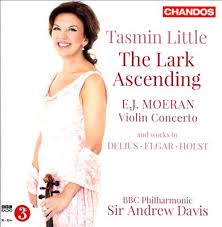The Dome, Brighton, 8 March 2014
An English Idyll was the selling point for this concert which began and ended with Elgar. His second Wand of Youth Suite opened the evening and its gentle melodies proved highly effective, particularly the slowly evolving line at the heart of The Little Bells. The Russian influence both musically and emotionally was evident in The Tame Bear, which led to an enthusiastic, but well-structured, finale with the Wild Bears.
In Delius’ The Walk to the Paradise Garden, David Hill brought out the Wagnerian rather than the Debussyan influences, making the whole seem heavier and more sombre in its unfolding than is often the case. Perhaps it was in contrast to the heady lightness of Tasmin Little’s playing of The Lark Ascending. This is not only Vaughan Williams’ most popular work but one of the all-time favourites, regularly at the top of the charts. That it has a potentially serious side too often goes unnoticed. Though drafted in 1914, before the massacres of the war, it seems to reflect the silence and emptiness of the countryside, the folk tunes a ghosted memory of the men who worked the land. It was both moving and lyrical as it spun its way ever upward.
After the interval David Hill brought us a strangely disparate view of Elgar’s first symphony. The first two movements were brash, fast and often over loud. There was very little sense of rubato in the approach and no portamento in the string sections. As such it was over-modern and aggressive. However the Adagio found a much better sense of style and balance, with the tempo not only relaxed but having a far finer sense of flow. This moved into the final movement which at last felt like Elgar and the nobility of the work was allowed to blossom.
The individual items were introduced by Petroc Trelawny. As the concert was not being broadcast one has to ask why? It added nothing to our experience of the music and his inability to get simple facts correct was irritating.
The Bournemouth Symphony Orchestra return to the Dome next year.

